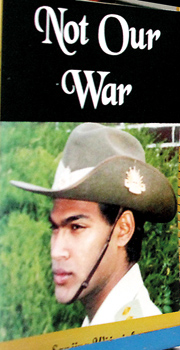A piece of authentic fiction
Dr. Sanjiva Wijesinha’s collection of short stories makes for very easy reading indeed. As a former officer of the Sri Lanka Light Infantry and more popularly, a medical officer of both the Sri Lanka Army Medical Corps and the Royal Australian Army Medical Corps, perhaps it’s no surprise that almost every story in the book is centred on war and medicine. What will strike the reader, however, is the delightful narrative of the writer who has discarded any pretence of literary eloquence in favour of blessedly simple, user-friendly language and an engaging writing style.

He begins with a preface-and disclaimer-denouncing any resemblance in the story to an actual person, dead or alive. He does inform the reader (very tongue-in-cheek) that they may spot what Carl Muller likes to call ‘faction’, an amusing blend of fact and faction. Indeed throughout the book one spots such stories all too familiar to Sri Lankans-occasionally painful to remember, but a timely reminder nonetheless.
Despite being a work of fiction, this authenticity Dr. Wijesinha brings to the table is certainly welcome. It begins with the cover-a war hardened young man with still a faint whiff of the hopeful in his manner-and travels along the paragraphs and pages. He begins with ‘Where Have All the Soldiers Gone?’ the tale of an army medical officer who learns that it is always better to keep a civil tongue, even when you think you know better. We move on to ‘Doctor Uncle’, the story of a doctor making a battleground decision to help the wounded enemy, only to discover a familiar face under the rubble. This element of surprise-a twist in the tale, if you will-is present at the end of most stories, lending a sense of anticipation after one begins to sense the pattern.
The voracious reader will soon begin to spot the trail leading to a twist-always a welcome experience when reading a book, short story or not. A particularly good one is ‘Loyalty’, about an English master and his dark-skinned servant spanning two generations. Then there’s ‘When Tiny Got Lost’, a story longer than most about a Sri Lankan man running away from his past in a foreign land only to repeat it in reverse.
Not all stories are strictly one with a plot. In ‘The Importance of Being like Ernest’, perhaps the funniest tale in the book, we meet Sergeant Ernest, a man whom his colleagues claimed had never done a full day’s work. The storyteller disagrees, extolling the virtues of knowing your place and your task in a set-up and sticking to it, just as Sgt. Ernest has done. “Most of these important individuals, I would discover, were so busy performing a plethora of tasks to justify their existence,” he says of other individuals he has worked with. “-that I used to long for the days when Sgt. Ernest was content to do his allotted task and let those about him get on with theirs.”
The title story ‘Not Our War’ is not as one would expect, with its Don Bradman autograph and narrative by a little boy. But it certainly strikes home, as do many other stories in the collection. This is perhaps because of their familiar setting-something most Sri Lankans would identify with. “Looking back now, I realise that our nation was torn apart by war for over a century,” says one protagonist. “-and there is hardly any one of us who has not lost friends, family and loved ones in this conflict.” Would he ever be able to bowl or hold a cricket bat again, wonders one injured soldier airborne on a stretcher. Would he ever be able to carry or hug his four-year-old son?
The writer clearly has a firm grasp of the essence of a short story with the 14 he has crafted for this book. Each one is short, sweet and gets to the point with minimum hassle. By no means are the stories ‘exquisitely crafted’ as you hear too often with such collections-but you get the sense that the good doctor wouldn’t want his stories to be considered works of great and complex literature.
These are simple tales of friendship, family, love, death and human compassion made all the more poignant by the harsh military setting they are more often than not based on.


